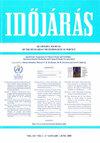关于巴纳特平原近60年极端温度演变的思考
IF 0.8
4区 地球科学
Q4 METEOROLOGY & ATMOSPHERIC SCIENCES
引用次数: 0
摘要
在寒冷的冬夜,我们经常听到这样的问题:“全球变暖到哪里去了,是不是应该更暖一些?”在普通人看来,巴纳特平原冬季仍然可以记录到的低温,或者媒体报道的影响世界各地的寒潮,似乎与科学界对全球变暖的担忧完全矛盾。在这篇文章中,我们试图跟踪一些可能以某种方式影响人口的气象参数的演变,即热带日数、冬季日数、热带夜数、霜冻夜数、绝对最高和最低温度。因此,将在巴纳特平原地区开展业务的三个国家气象部门(罗马尼亚、匈牙利和塞尔维亚)获得的数据分组到一个共同的数据库中,并在Excel中进行分析,并借助非参数Mann-Kendall检验,得出一系列关于上述参数演变的结论。以及高温风险的增加是如何通过低温风险的降低来补偿的。本文章由计算机程序翻译,如有差异,请以英文原文为准。
Considerations regarding the evolution of extreme temperatures in the Banat Plain in the last six decades
During cold winter nights we often hear the question "where is the global warming, should it not be warmer?". Low temperatures that can still be recorded in the Banat Plain during winter or media reports of cold waves affecting various regions worldwide seem to the common man to be in total contradiction with the concerns of the scientific community about global warming. With this article we are trying to follow the evolution of some meteorological parameters that can affect the population in one way or another, namely number of tropical days, number of winter days, number of tropical nights, number of frosty nights, absolute maximum and minimum temperatures. Thus, the data obtained from the three national meteorological services (Romanian, Hungarian, and Serbian) operating on the territory of the Banat Plain were grouped in a common database and analyzed both in Excel and with the help of the non-parametric Mann-Kendall test, obtaining a series of conclusions on the evolution of the abovementioned parameters, as well as on the way how the increase in the risk of high temperatures is compensated (or not) by the decrease in the risk of low temperatures.
求助全文
通过发布文献求助,成功后即可免费获取论文全文。
去求助
来源期刊

Idojaras
地学-气象与大气科学
CiteScore
1.60
自引率
11.10%
发文量
9
审稿时长
>12 weeks
期刊介绍:
Information not localized
 求助内容:
求助内容: 应助结果提醒方式:
应助结果提醒方式:


